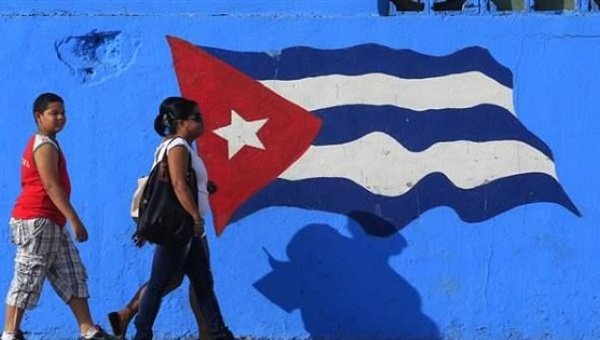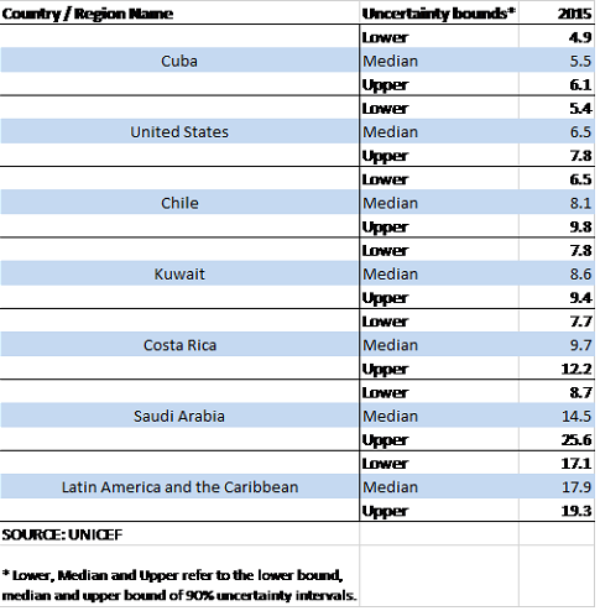The World Must Learn from Cuba
LATIN AMERICA AND THE CARIBBEAN, 9 Jan 2017
On the anniversary of the Cuban Revolution, why has the small Caribbean nation outperformed many capitalist democracies in key ways despite fifty years of blockade, attacks, sanctions, injustices?

“Cuba’s achievements expose the very limited, and often deplorable, nature of capitalist democracy.”
1 Jan 2017 – According to UNICEF’s most recent statistics (updated to 2015), Cuba, for almost two decades, has had a lower child mortality rate than the United States. That’s an astounding human rights achievement – especially when you consider that Cuba has been under merciless assault by the United States for over fifty years – an assault that has included major acts of terrorism (like blowing up a factory and killing hundreds of workers in the middle of the Cuban missile crisis) not simply economic strangulation.
RELATED: Cuba-Trained Doctors Head to Standing Rock
What Cuba has accomplished while under sustained attack by a superpower shames every capitalist democracy in Latin America. There is no excuse for any having a higher child mortality rate than Cuba today, not even the countries that were the farthest behind Cuba when Castro seized power in 1959. Being stuck with depraved dictators like the Duvaliers or Somozas absolves the people of those countries (their victims) but not the political systems, and certainly not their sponsors in Washington. If every country in Latin America and the Caribbean had Cuba’s child mortality rate, there would have been about 136,000 fewer child deaths in the region in 2015 alone. People who scoff at Cuba’s achievements in health care are being contemptuous of human life, not only human rights.
In fairness, there are times when U.S. imperialists identify health care as a basic human right. Human Rights Watch recently did an extensive report on Venezuela’s struggling health care system but, shockingly, did not cite UNICEF statistics on child or infant mortality because they contradicted many of HRW’s claims.
The table below shows child mortality in Cuba and other selected countries according to UNICEF’s most recent data.
Kuwait and Saudi Arabia are two fabulously oil-rich dictatorships that are staunchly backed by the U.S. government. In fact, the United States went to war to re-install Kuwait’s dictatorship after it was overthrown by Iraq’s invasion in 1990. Chile spent decades under Pinochet’s dictatorial rule which was often praised by the international corporate media for its far right economic policies. Costa Rica is sometimes offered as example of what Cuba might have achieved “without repression”. Cuba, without exceptional natural wealth and despite decades of ferocious U.S. sabotage, has outperformed them all in reducing child mortality. Why? There are two general reasons.
Go ahead and blow off steam. We’ll ignore you.
I agree with people who say that “freedom of expression” is an end in itself – not just a way to get good public policy. However, extreme concentrations of wealth “take the risk out of democracy” as Alex Carey put it. If elites can dominate the means of communication then being able to publicly express harsh criticism of the government will have minimal impact on policy. Health care policy in the United States is a striking example. Public opinion has simply been dismissed. A closely related problem is the stunning ignorance that elites impose through control of the media while still allowing some dissent.
Cuba’s government does not tolerate dissent through the mass media, but, as Avi Chomsky observed in a detailed study “Cuban citizens nominate candidates and vote in secret ballot elections; they participate in mass organizations; they participate in neighborhood, workplace, and municipal where real problems are discussed and debated, and decisions made.”
httpv://www.youtube.com/watch?v=N_zV5v7zbxQ
The exceptional health outcomes Cuba has achieved under severe constraints point to a government that actually responds to the public’s concerns – and that does provide avenues for dissent to be expressed. I will anger some friends by saying that this does not make Cuba a democracy, but it does expose the absurdity of governments that congratulate themselves for allowing dissent while also ignoring widespread public dissatisfaction and disillusionment with impunity.
Spend forty hours a week under dictatorial rule – if you’re lucky.
Dictatorial workplaces (a key way to ensure elite control over wealth and investment decisions) are much more crucial feature of capitalism than competitive markets. Capitalists are often opposed to competitive markets as U.S. economist Dean Baker has often explained – most recently in his new book “Rigged.”
If you are lucky enough to have a steady job, even if you are lucky enough have a strong union that protects your income and dignity in the workplace, you are still spending a great deal of your life under dictatorial rule. Unions mitigate the dictatorial powers of CEOs and elite shareholders. Unions do not change the basic fact that ultimate control over investment and productions rests with an elite whose enrichment is deemed the highest priority. The arguments for allowing workplace dictatorship are no more compelling than arguments for dictatorship as a form of government. If workers in capitalist democracies spend so much of their lives under dictatorial rule at work, it should not be surprising that so many capitalist democracies compare poorly with Cuba in important ways. I am not arguing that workplaces are more democratic in Cuba than in most countries. I am saying that capitalism imposes such serious and barely discussed constraints on democracy that the distinction between “democracy” in many countries and “dictatorship” in Cuba is not as great as is typically assumed.
RELATED: When Africa Called, Fidel and Cuba Answered
Cuba’s achievements expose the very limited, and often deplorable, nature of capitalist democracy. That said, leftists in the United States and other rich western countries make a grave error when they exaggerate the shortcomings of U.S. democracy to such an extent that they embrace defeatism. The saying that “if voting could change anything it would be illegal” is quite dysfunctional. However, it is true that one cannot vote corporate power away in a single election.
I’ve focussed on Cuba’s child mortality rate, but, given the threat to human existence posed by the impact of human activity on the climate, it should be noted that Cuba has achieved rich country health outcomes with only a tiny fraction of the CO2 emissions per capita and without using nuclear power. With all its faults, if Cuba’s system spread to the entire world, humans could at least survive to work on eliminating those faults. The same cannot be said for capitalism. Learning from Cuba should be a high priority if we value survival.
Go to Original – telesurtv.net
DISCLAIMER: The statements, views and opinions expressed in pieces republished here are solely those of the authors and do not necessarily represent those of TMS. In accordance with title 17 U.S.C. section 107, this material is distributed without profit to those who have expressed a prior interest in receiving the included information for research and educational purposes. TMS has no affiliation whatsoever with the originator of this article nor is TMS endorsed or sponsored by the originator. “GO TO ORIGINAL” links are provided as a convenience to our readers and allow for verification of authenticity. However, as originating pages are often updated by their originating host sites, the versions posted may not match the versions our readers view when clicking the “GO TO ORIGINAL” links. This site contains copyrighted material the use of which has not always been specifically authorized by the copyright owner. We are making such material available in our efforts to advance understanding of environmental, political, human rights, economic, democracy, scientific, and social justice issues, etc. We believe this constitutes a ‘fair use’ of any such copyrighted material as provided for in section 107 of the US Copyright Law. In accordance with Title 17 U.S.C. Section 107, the material on this site is distributed without profit to those who have expressed a prior interest in receiving the included information for research and educational purposes. For more information go to: http://www.law.cornell.edu/uscode/17/107.shtml. If you wish to use copyrighted material from this site for purposes of your own that go beyond ‘fair use’, you must obtain permission from the copyright owner.
Read more
Click here to go to the current weekly digest or pick another article:
LATIN AMERICA AND THE CARIBBEAN:
